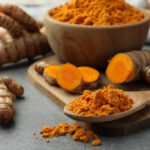Curcumin lowers blood sugar, quenches inflammation and fights type 2 diabetes
 (NaturalHealth365) Over 38 million Americans currently have type 2 diabetes, raising their risk for heart disease, vision loss, circulatory problems, and kidney failure. As rates of the disease continue to rise nationwide, some researchers are investigating natural, non-toxic interventions that may help alleviate this serious chronic condition. Curcumin, which is derived from turmeric, might just be the ticket.
(NaturalHealth365) Over 38 million Americans currently have type 2 diabetes, raising their risk for heart disease, vision loss, circulatory problems, and kidney failure. As rates of the disease continue to rise nationwide, some researchers are investigating natural, non-toxic interventions that may help alleviate this serious chronic condition. Curcumin, which is derived from turmeric, might just be the ticket.
Turmeric has long been treasured in Ayurveda and Traditional Chinese Medicine for its anti-inflammatory properties. A new meta-analysis published in Diabetology and Metabolic Syndrome reveals that curcumin in turmeric can not only help lower blood sugar and manage type 2 diabetes but may even help prevent it in those at risk. However, there is one “catch,” which is that the body does not easily absorb curcumin. But no worries! A few simple techniques can help you maximize the absorption of this amazing compound and allow you to put curcumin to work, supporting healthy blood sugar levels and discouraging diabetes.
Curcumin appears to “check all the boxes” for promoting blood sugar control
To conduct the latest meta-analysis, researchers evaluated a series of randomized controlled studies involving the effects of curcumin supplementation on glycemic control in adults. They concluded that curcumin effectively improved fasting blood sugar, fasting insulin levels, hemoglobin A1C (a measure of blood sugar control over time), and insulin resistance. The authors stated that “curcumin can be considered a complementary method in the management of disturbed glycemia.”
In other words, curcumin can help regulate and normalize hyperglycemia, or high blood sugar.
And this isn’t the only recent research highlighting the therapeutic benefits of curcumin. A 2023 meta-analysis published in Complementary and Therapeutic Medicine examined 59 controlled studies involving curcumin’s effects on glycemic levels, cholesterol profiles, blood pressure, and inflammatory markers in patients with nonalcoholic fatty liver disease. Since the liver – which stores glucose – plays an important role in managing blood sugar, this research has implications for those with diabetes as well. The researchers concluded that curcumin supplementation is associated with “significant” improvements in fasting blood glucose, total cholesterol, LDL cholesterol levels, body mass, and weight.
Curcumin supports coronary and metabolic health
Yet another analysis, published in 2022 in Critical Reviews in Food and Science Nutrition, studied the effect of curcumin on body weight and heart health in patients with metabolic syndrome, a linked group of unhealthy conditions that includes high blood sugar, high blood pressure, excess abdominal fat, and abnormal cholesterol levels. The authors reported that curcumin, in the form of a more absorbable variety known as nanocurcumin, improved fasting blood glucose, insulin resistance, and levels of beneficial HDL cholesterol.
It also reduced body weight by an average of 0.94 kg (roughly 2 pounds). While this may seem modest, it is the type of small but significant loss that, combined with other diet modifications, can add up to a solid “win.” More good news: nanocurcumin also reduced C-reactive protein – a pro-inflammatory molecule associated with heart disease – and raised levels of adiponectin, a hormone that can cause a beneficial increase in sensitivity to insulin.
Ease inflammation and reduce oxidative stress
Why, exactly, is curcumin so helpful in addressing blood sugar issues?
Blood sugar naturally rises after eating, signaling the pancreas to release insulin, which then helps cells utilize the sugar for energy. Problems begin when inflammation and other factors cause cells to become less sensitive to insulin – a condition known as insulin resistance. As a result, sugar can overstay its welcome in the blood and trigger hyperglycemia – which in turn produces more inflammation.
In addition, oxidative stress can suppress insulin secretion and interfere with glucose transport. With its strong anti-inflammatory and antioxidant properties, curcumin appears uniquely positioned to help.
Scientists have developed “workarounds” for curcumin’s low bioavailability
While curcumin offers important benefits, its poor bioavailability can make these difficult to access. Scientists believe that the answer may lie with nanocurcumin. According to research, nanocurcumin – very small particles with a higher surface-to-volume ratio – is more soluble, stable, and absorbable than pure curcumin.
Other methods of improving curcumin absorption include taking it with galactomannan, a type of fiber found in the spice fenugreek, and with black pepper. Piperine, the active constituent in black pepper, can increase the absorption of curcumin by a stunning 2,000 percent.
Look for a high-quality organic product formulated to contain 95 percent curcuminoids. Holistic healthcare providers typically advise 500 to 2,000 mg daily, but consult your holistic doctor before supplementing. Of course, never stop taking prescribed medication unless advised by your doctor.
By the way, you don’t have to be diabetic to access the many gifts of curcumin. Studies have shown that this hard-working compound can benefit healthy people as well. Whether you’re looking to balance blood sugar, ease inflammation, or simply promote general health and well-being, don’t overlook curcumin as a promising natural solution.
Sources for this article include:



